In the midst of discussions about banning lawmakers from holding stock while in office, the spotlight shifts to President Donald Trump’s potential acceptance of a 747 jet gift from Qatar for official use, raising legal and ethical concerns. Despite the Trump family’s extensive business ventures overseas, including in the Middle East, the notion of receiving such a gift has garnered mixed reactions, with even some Republicans expressing unease.
Senator Josh Hawley emphasized the importance of American-made aircraft, highlighting the reluctance among many, including GOP lawmakers, to support the idea of Qatar’s gift. Criticisms extended to Qatar and Saudi Arabia for various reasons, including their alleged support of terrorist activities. Concerns were raised about potential conflicts of interest and the need for accountability in government dealings.
Economist Eswar Prasad warned against Trump’s involvement in cryptocurrency-related ventures, citing worries about financial speculation and potential conflicts of interest. Amid calls for greater oversight and restrictions on lawmakers’ financial activities, such as the proposed PELOSI Act by Hawley, questions persist about the influence of personal interests on political decisions.
The intertwining of business interests with official government matters, as seen in instances involving Elon Musk’s interactions with Saudi Arabia and Trump’s business dealings, underscores the complexities and challenges of maintaining transparency and ethical standards in political landscapes. As debates on accountability and ethical governance continue, the need for stringent regulations to prevent conflicts of interest remains a pressing concern.

